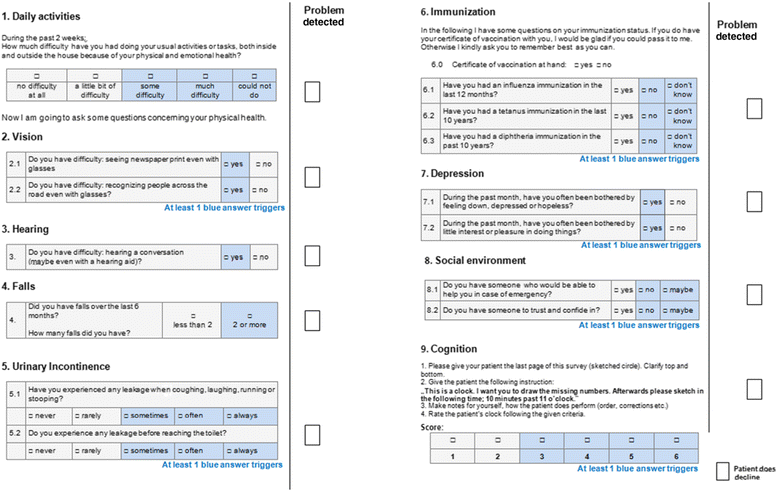"It's MAGIC"--development of a manageable geriatric assessment for general practice use
- PMID: 25608946
- PMCID: PMC4320637
- DOI: 10.1186/s12875-014-0215-4
"It's MAGIC"--development of a manageable geriatric assessment for general practice use
Abstract
Background: Geriatric assessments are established tools in institutional care since they enable standardized detection of relevant age-related disorders. Geriatric assessments could also be helpful in general practice. However, they are infrequently used in this setting, mainly due to their lengthy administration. The aim of the study was the development of a "manageable geriatric assessment--MAGIC", specially tailored to the requirements of daily primary care.
Methods: MAGIC was developed based on the comprehensive Standardized Assessment for Elderly People in Primary Care (STEP), using four different methodological approaches: We relied on A) the results of the PRISCUS study by assessing the prevalence of health problems uncovered by STEP, the importance of the respective problems rated by patients and general practitioners, as well as the treatment procedures initiated subsequently to the assessment. Moreover, we included findings of B) a literature analysis C) a review of the STEP assessment by experienced general practitioners and D) focus groups with general practitioners.
Results: The newly created MAGIC assessment consists of 9 items and covers typical geriatric health problems and syndromes: function, falls, incontinence, cognitive impairment, impaired ears and eyes, vaccine coverage, emotional instability and isolation.
Conclusions: MAGIC promises to be a helpful screening instrument in primary care consultations involving elderly multimorbid patients. Applicable within a minimum of time it still covers health problems highly relevant with regard to a potential loss of autonomy. Feasibility will be tested in the context of a large, still ongoing randomized controlled trial on "reduction of potentially inadequate medication in elderly patients" (RIME study; DRKS-ID: DRKS00003610) in general practice.
Figures
References
Publication types
MeSH terms
Associated data
LinkOut - more resources
Full Text Sources
Other Literature Sources


